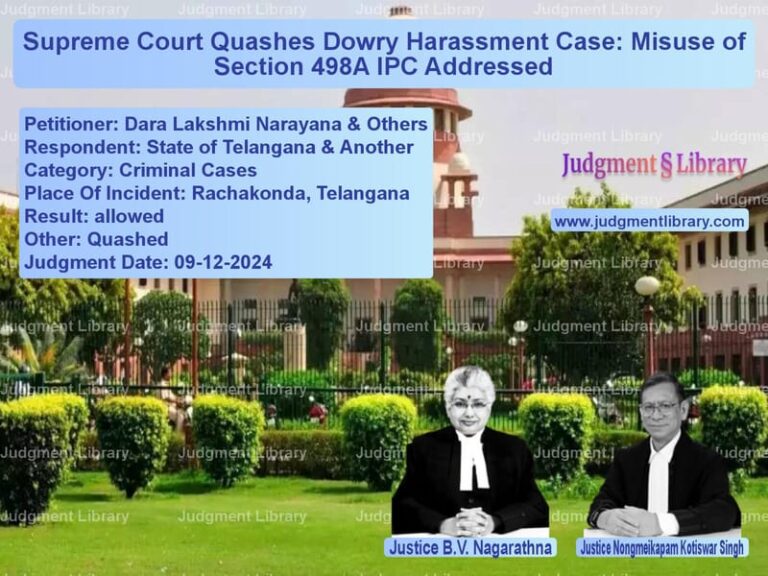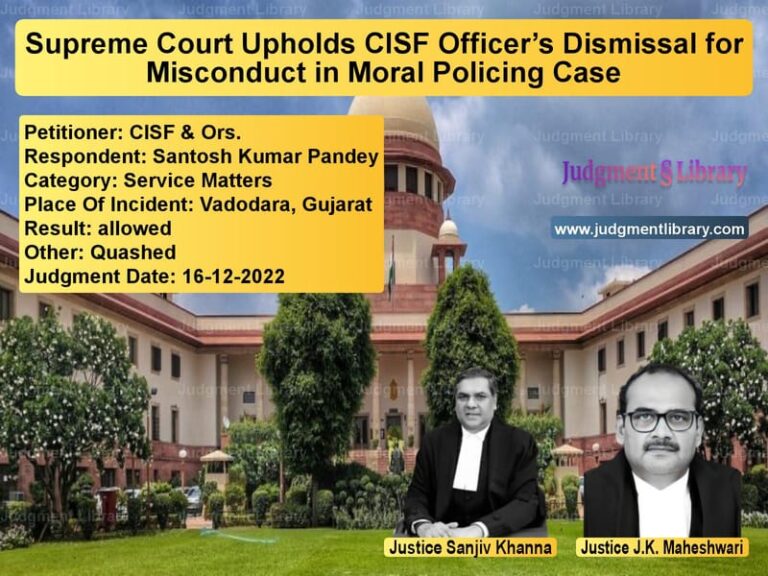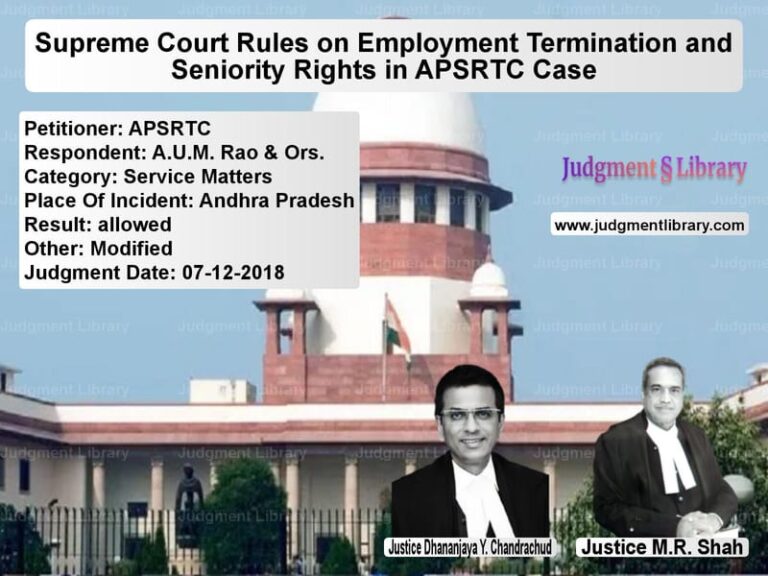Supreme Court Orders Juvenility Inquiry in Bihar Murder Case
The Supreme Court of India has directed a fresh inquiry into the claim of juvenility in the case of Rahul Kumar Yadav vs. The State of Bihar. This case, which involves charges under Sections 302 and 394 of the Indian Penal Code (IPC) and Section 27(2) of the Arms Act, initially resulted in a death sentence that was later commuted to life imprisonment. The Court has now ordered an age determination inquiry based on the appellant’s claim that he was a juvenile at the time of the offense.
Background of the Case
On July 27, 2011, the appellant, Rahul Kumar Yadav, along with co-accused individuals, was convicted for murder and robbery. The Trial Court sentenced them to death. Upon appeal, the Patna High Court issued a split decision: one judge upheld the conviction, while another called for an acquittal. A third judge later confirmed the conviction but commuted the sentence to life imprisonment in 2017.
During the trial, Yadav filed an application claiming he was a juvenile at the time of the offense. The trial court and the High Court rejected his plea without conducting a detailed inquiry.
Legal Issues Considered
The Supreme Court examined the following key issues:
- Whether the appellant’s claim of juvenility was wrongly rejected by lower courts.
- Whether the courts followed proper procedural safeguards under the Juvenile Justice (Care and Protection of Children) Act, 2015 (JJ Act, 2015).
- Whether a fresh age determination inquiry was required.
Arguments by the Appellant (Rahul Kumar Yadav)
- His plea of juvenility was dismissed without inquiry by the trial court.
- The High Court also failed to examine the claim in detail, violating his rights under the JJ Act.
- According to his birth certificate, he was a minor at the time of the offense.
- The Juvenile Justice Act allows for claims of juvenility to be raised at any stage, even after conviction.
Arguments by the Respondent (State of Bihar)
- The claim of juvenility was delayed and should not be entertained.
- The appellant had already undergone trial and conviction, and reopening the case would disrupt judicial finality.
- The lower courts had considered the plea and found it lacking sufficient evidence.
Supreme Court’s Judgment
The Supreme Court directed a fresh inquiry into the appellant’s claim of juvenility. The key observations included:
1. Right to Raise Juvenility Claim at Any Stage
- The Court reaffirmed that under Section 9(2) of the JJ Act, 2015, a claim of juvenility can be raised at any stage, even after conviction.
- The trial court erred in dismissing the plea without a proper age determination inquiry.
2. Supreme Court’s Reliance on Precedents
The Court referred to key precedents, including:
- Abuzar Hossain vs. State of West Bengal (2012) – Recognized that juvenility can be raised even after final disposal of a case.
- Vinod Katara vs. State of Uttar Pradesh (2022) – Emphasized that age determination inquiries must be conducted thoroughly.
- Pratap Singh vs. State of Jharkhand – Highlighted the objective of the JJ Act in prioritizing rehabilitation over punishment.
3. Order for Age Determination Inquiry
- The First Additional Sessions Judge, Darbhanga, was directed to conduct an inquiry into the appellant’s age.
- The police were ordered to assist in gathering school records, birth certificates, and medical evidence.
- If documentary evidence was inconclusive, the court could order an ossification test to determine bone age.
4. Timeline for Completion
- The Court mandated the completion of the inquiry within 12 weeks.
- A copy of the findings was to be submitted to the Supreme Court.
Legal Implications of the Judgment
This ruling reinforces several legal principles:
- Right to Fair Trial: Juvenility claims must be properly examined before imposing adult criminal liability.
- Judicial Review of Age Claims: Courts must conduct a full-fledged inquiry rather than dismissing claims outright.
- Role of the Juvenile Justice Act: The law prioritizes rehabilitation over punishment for minors.
- Burden of Proof in Age Determination: The burden is on the accused to produce credible evidence, but courts must facilitate fair verification.
Conclusion
The Supreme Court’s ruling in Rahul Kumar Yadav vs. The State of Bihar underscores the importance of juvenile justice and procedural fairness. By directing a fresh age determination inquiry, the Court has ensured that no individual is denied their legal rights due to procedural lapses. This judgment will serve as an important precedent in safeguarding the rights of juveniles accused of crimes and ensuring due process in criminal trials.
Petitioner Name: Rahul Kumar Yadav.Respondent Name: The State of Bihar.Judgment By: Justice B.R. Gavai, Justice Sandeep Mehta.Place Of Incident: Darbhanga, Bihar, India.Judgment Date: 25-04-2024.
Don’t miss out on the full details! Download the complete judgment in PDF format below and gain valuable insights instantly!
Download Judgment: rahul-kumar-yadav-vs-the-state-of-bihar-supreme-court-of-india-judgment-dated-25-04-2024.pdf
Directly Download Judgment: Directly download this Judgment
See all petitions in Juvenile Justice
See all petitions in Murder Cases
See all petitions in Judgment by B R Gavai
See all petitions in Judgment by Sandeep Mehta
See all petitions in Remanded
See all petitions in Remanded
See all petitions in supreme court of India judgments April 2024
See all petitions in 2024 judgments
See all posts in Criminal Cases Category
See all allowed petitions in Criminal Cases Category
See all Dismissed petitions in Criminal Cases Category
See all partially allowed petitions in Criminal Cases Category







